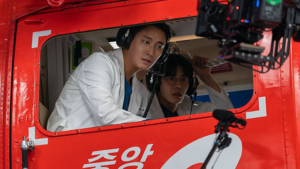Trauma Code: Heroes on Call
By Moniz Wong
 Thinking back to question ‘why do you want to study medicine?’, I’d imagine that many of us can attribute that to the medical shows that we’ve been exposed to since young. Whether it is the long-running Grey’s Anatomy, the classic The Good Doctor or more recent hits such as This is Going to Hurt, there is no doubt that medicine in media, particularly in the form of dramas has had wide reaching influences on aspiring youths (like you and I!) into a pursuing a path of medicine.
Thinking back to question ‘why do you want to study medicine?’, I’d imagine that many of us can attribute that to the medical shows that we’ve been exposed to since young. Whether it is the long-running Grey’s Anatomy, the classic The Good Doctor or more recent hits such as This is Going to Hurt, there is no doubt that medicine in media, particularly in the form of dramas has had wide reaching influences on aspiring youths (like you and I!) into a pursuing a path of medicine.
As someone who spent most of their life in Asia, my earliest memories on medical dramas were somewhat different: while thrilling to watch at the time, my opinion on local medical shows from my childhood had always been mixed; whether it is due to their use of watery bright-red liquid for blood, or their tendencies to veer off into romantic subplots between characters, I wasn’t too invested on them as a child. As I grew up, I naturally gravitated towards western medical dramas hoping for a more realistic viewing experience. Suffice to say that while scenes were more realistic (at the time), it seemed like general viewers loved relationship troubles too much for medical shows to be entirely removed from it.
In recent years I had gone back to watching Asian medical dramas. Seeing how medical systems are portrayed in media around the world always offered a fresh perspective as to the parts that work (and the parts that don’t). And such is the case with the newest hot hit from South Korea after Squid Game Season 2: ‘Trauma Code: Heroes of Call’ (which I am also happy to say has no romantic subplots at all).
The series, based on a popular medical web novel written by an actual practicing otolaryngologist, starts off with a dramatic start: our main protagonist Dr. Baek Kang-hyuk is seen racing through the streets of a war-torn Afghanistan in a motorcycle, weaving between cars and avoiding explosions from bombs, before finally reaching the hospital where patients require urgent medical treatment.
Flashback to present day, Dr. Baek now returns to Seoul under the endorsement of the health minister to establish a top-tier trauma centre at the Hunkuk University Hospital. An ambitious yet abrasive doctor, Dr. Baek strives to train and lead his medical team to save lives in extreme events.
Without spoiling much, I found myself thoroughly enjoying the fast-paced narrative. With only eight episodes and the nature of emergency cases in the trauma centre, the show never lingers too long in one moment. Equipped with newfound knowledge from my time at the medical school, I found myself exclaiming over familiar conditions in the show that is covered in my lectures: ‘Oh, so that’s what happens with cardiac tamponade!’ Although the show’s focus on tense hospital politics errs a bit on the theatrical side, it makes up for it with its emotional depth and dynamic character development.

The series also reflects the realities of practising medicine in modern day South Korea: there is ongoing conflict between the government and the medical community regarding the government’s plan to increase the number of places at medical schools in a bid to expand the capacity of the medical system, while disregarding the need for fair pay and adequate working conditions for existing doctors. Thousands of residents and interns had since resigned in protest, which had contributed to doctor shortages in emergency rooms.
Money is also the main issue driving one of the main conflicts in the show, Dr. Baek is constantly under pressure from the hospital management to cut costs and maximise profits. As Dr. Baek utilises more resources, such as the use of emergency helicopters to save more lives, the deficit for the trauma department rises. In episode 6, when a man suffered a severe head injury while hiking, Dr. Baek attempted to secure a helicopter from the National Rescue Unit, only to find out that the helicopter pilot had been reassigned. The new head of the unit refused Dr. Baek’s requests and informed him that the helicopter can only be dispatched following official approval. The hospital director was later found to have interfered in delaying the care for the injured man in a plan to reduce costs from the trauma department.

The show highlights elements in South Korea’s healthcare system that are different from that of the UK’s. While public healthcare is provided through the National Health Insurance, private healthcare is also well-established, offering an alternative choice for residents for shorter lines and premium services. This is familiar to me as someone who comes from a place where the medical system operates in the same way as Korea. However, this also means that financial conflicts mentioned above are more prominent and occur more frequently in private hospitals. While I’ll not comment much on whether healthcare should be privatised (which would be another discussion topic altogether). The show does lead you to reflect on effectiveness of such medical systems.
Another difference is that the post ‘trauma surgeon’ does not currently exist in the UK. Instead, doctors interested in trauma surgery are trained in Trauma and Orthopaedics (T&O), where work largely involved broken bones rather than the care of trauma patients in general. Currently, plans are made to address the lack of a dedicated training pathway for surgeons in trauma care through the Major Trauma Workforce Project. At times like these, the show offers surprisingly insights through tiny difference which resulted in me pondering on how healthcare systems should (or should not) work.
Whether you are just looking for a good time, or you are interested in learning more about trauma surgery, I’d recommend giving The Trauma Code: Heroes on Call a go. With a captivating blend of intense medical drama and theatrical flair, the shows promises an entertaining viewing experience for fans of medical dramas. While it may be a tad bit dramatic at times, the show offers valuables insights on the nature of trauma care and the current state of Korea’s healthcare system.



